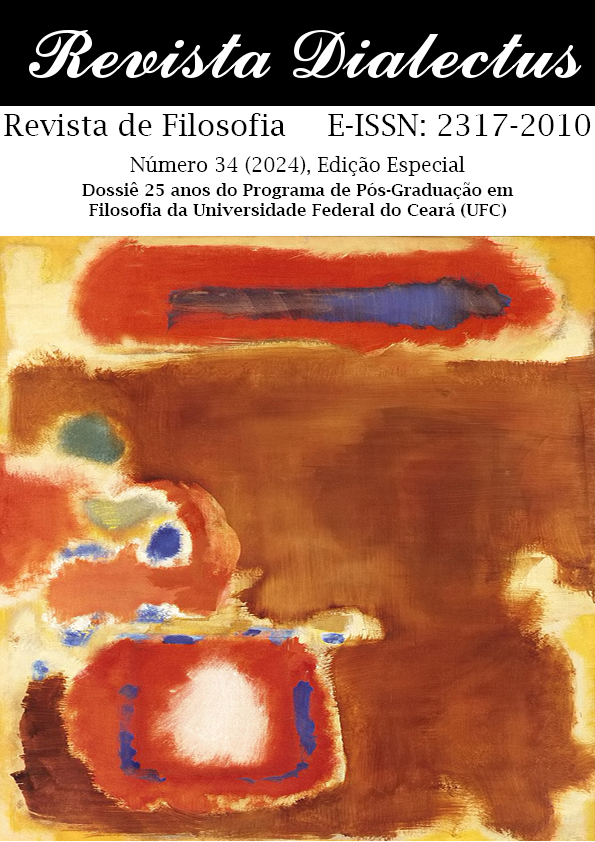NATUREZA E NEGAÇÃO DA VONTADE LIVRE EM FEUERBACH
DOI:
https://doi.org/10.30611/2024n34id94586Keywords:
Conceito de Natureza em Feuerbach, Natureza e Vontade em FeuerbachAbstract
O presente artigo pretende destacar a tese de que a natureza, conforme Feuerbach, é um existente autônomo e independente e possui primazia ante o espírito. Sob essa condição, é possível conceber a natureza como a garantia da exterioridade mesma, como que um existente fora de nós, que nada sabe de si e é em si e por si mesmo; por conseguinte, ela não deve ser vista como aquilo que ela não é, isto é, nem como divina, nem como humana. A natureza sempre existiu, quer dizer, ela existe por si e tem seu sentido apenas em si mesma; ela é ela mesma, ou seja, nenhuma essência mística, pois, por trás dela, não se esconde nenhum absoluto, nada humano, nada divino, transcendental ou ideal. Trata-se aqui também de uma exposição da ética materialista, a-posteriorística, de Ludwig Feuerbach a partir de sua crítica a toda ética apriorística, transcendental, ilimitada, indiferente, imediata, pura, vazia de conteúdo, abstraída das determinações, da situação concreta, baseada numa vontade incondicionada, indeterminada, numa pretensa liberdade humana independente tanto dos limites e das leis da natureza externa, quanto da natureza interna, da determinação corporal e das necessidades naturais humanas. Com isso, não há, todavia, em Feuerbach um determinismo ou uma negação da vontade, mas a defesa de que a liberdade humana não é absoluta e incondicionalmente livre, mas condicionada pelo tempo, pelo momento histórico, pela idade, por meios materiais e sensíveis, pela situação ambiental, pelas condições e circunstâncias da natureza, como alimento, vestimentas, luz, ar, água, espaço e tempo, pois ter vontade é sempre ter vontade de algo, já que ela é sempre vontade mediada por um objeto, e é só através das condições e mediações que se alcança a liberdade, e, assim, a vontade se torna concreta.
References
BRAUN, H-J. Ludwig Feuerbachs Lehre vom Menschen. Stuttgart-Bad Cannstatt: Friedrich Frommann Verlag, 1971, p. 111.
CHAGAS, Eduardo Ferreira. Natureza e Liberdade em Feuerbach e Marx. Campinas: Editora Phi, 2016.
CHAGAS, Eduardo Ferreira. Die Autarkie der Natur bei Ludwig Feuerbach. In: Reitemeyer, Ursula; Polcik, Thassilo; Gather, Katharina; Schlüter, Stephan. (Org.). Das Programm des realen Humanismus - Festschrift für Ludwig Feuerbach zum 150. Todesjahr. 1ed.Münster: Waxmann, 2023, v. 9, p. 153-168.
DESCARTES, René. Meditações. São Paulo: Abril Cultural (Os Pensadores), 1983a.
DESCARTES, René. Objeções e Respostas. São Paulo: Abril Cultural (Os Pensadores), 1983b.
FEUERBACH, Ludwig. Pierre Bayle. Ein Beitrag zur Geschichte der Philosophie und Menschheit (1838). Berlim: Akademie, 1967b.
FEUERBACH, Ludwig. Vorlesungen über das Wesen der Religion (1851). Nebst Zusätzen und Anmerkungen. Berlim: Akademie, 1967a.
FEUERBACH, Ludwig. Über das Wesen der Religion in Beziehung auf R. Hayms Feuerbach und die Philosophie. Org. por W. Schuffenhauer. Berlin: Akademie-Verlag, 1971a, GW 10.
FEUERBACH, Ludwig. Die Unsterblichkeitsfrage vom Standpunkt der Anthropologie. Org. por W. Schuffenhauer. Berlin: Akademie-Verlag, 1971b, GW 10.
FEUERBACH, Ludwig. Geschichte der neuern Philosophie von Bacon von Verulam bis Benedikt Spinoza (1833). Berlim: Akademie, 1969a.
FEUERBACH, Ludwig. Geschichte der neuern Philosophie. Darstellung, Entwicklung und Kritik der Leibnizschen Philosophie (1837). Berlim: Akademie, 1969b.
FEUERBACH, Ludwig. Theogonie nach den Quellen des klassischen, hebräischen und christlichen Altertums (1857). Berlim: Akademie, 1969c.
FEUERBACH, Ludwig. Zur Kritik der Hegelschen Philosophie. Org. Por Werner Schuffenhauer. Berlin: Akademie-Verlag, 1970.
FEUERBACH, Ludwig. Das Wesen des Christesntums (1841), Berlim: Akademie, 1973.
FEUERBACH, Ludwig. Über Spiritualismus und Materialismus, besonders in Beziehung auf die Willensfreiheit. Org. por W. Schuffenhauer. Berlin: Akademie-Verlag, 1972, GW 11.
FEUERBACH, Ludwig. Zur Moralphilosophie. In: Nachlass. Organizado por Karl Grün. Leipzig & Heidelberg: C. F.Winter’sche Verlagshandlung, 1874, Bd. II.
FICHTE. Das System der Sittenlehre. Werke auf CD-ROM. Berlin: 1997.
HÜSSER, Heinz. Natur ohne Gott. Aspekte und Probleme von Ludwig Feuerbachs Naturverständnis. Würzburg: Königshausen und Neumann, 1993.
PLATON. Phaidon. Tradução de Friedrich Schleiermacher. Darmstadt: Wissenschaftliche Buchgesellschaft, 1974, Werke, Bd. 3 (grego e alemão).
Downloads
Published
Issue
Section
License
Copyright (c) 2024 Eduardo Ferreira Chagas

This work is licensed under a Creative Commons Attribution-NonCommercial-NoDerivatives 4.0 International License.
Authors who publish in this journal agree to the following terms:
- Authors retain the copyright and grant the journal the right of first publication, with the work simultaneously licensed under the Attribution-NonCommercial-NoDerivatives 4.0 International (CC BY-NC-ND 4.0) License, which allows the non-commercial sharing of work, without modifications and with acknowledgment of authorship and initial publication in this journal.
- Authors are authorized to take additional contracts separately, for non-exclusive distribution of the version of the work published in this journal (eg publish in institutional repository or as a book chapter), with acknowledgment of authorship and initial publication in this journal.
- Authors are allowed and encouraged to publish and distribute their work online (eg in institutional repositories or on their personal page) at any point before or during the editorial process, as this can generate productive changes as well as increase the impact and citation of published work (See The Free Access Effect).



















